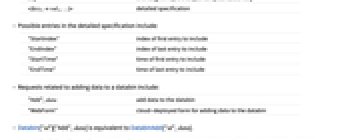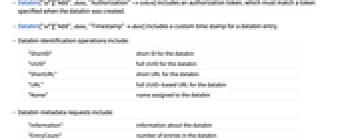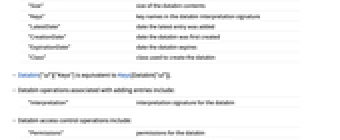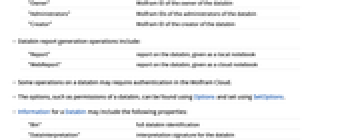Databin["id"]
represents a databin in the Wolfram Data Drop.
Databin["id",n]
represents the first n entries in a databin.
Databin["id",-n]
represents the most recent n entries in a databin.
Databin["id",{m,n}]
represents entries m through n in a databin, with negative numbers counting from the end.
Databin["id",{m,n,s}]
represents entries m through n with step s.
Databin["id",time]
represents entries going back for the quantity of time specified by time.
Databin["id",date]
represents the entries in a databin from the specified date to now.
Databin["id",{date1,date2}]
represents the entries in a databin from date1 to date2.
Databin["id",range,{"key1","key2",…}]
represents only elements with keys keyi within each entry in a databin.


Databin
Databin["id"]
represents a databin in the Wolfram Data Drop.
Databin["id",n]
represents the first n entries in a databin.
Databin["id",-n]
represents the most recent n entries in a databin.
Databin["id",{m,n}]
represents entries m through n in a databin, with negative numbers counting from the end.
Databin["id",{m,n,s}]
represents entries m through n with step s.
Databin["id",time]
represents entries going back for the quantity of time specified by time.
Databin["id",date]
represents the entries in a databin from the specified date to now.
Databin["id",{date1,date2}]
represents the entries in a databin from date1 to date2.
Databin["id",range,{"key1","key2",…}]
represents only elements with keys keyi within each entry in a databin.
Details








- In Databin["id"], id can be a short ID, a complete UUID, or a short or long URL.
- The long URL for a databin in the Wolfram Cloud is of the form datadrop.wolframcloud.com/databin/
 .
. - Databin uses the standard sequence specification:
-
All all entries n entries 1 through n -n last n entries {n} entry n only {m,n} entries m through n inclusive {m,n,s} entries m through n in steps of s - Databin["id"] is equivalent to Databin["id",All].
- In Databin["id",time], time is specified as a Quantity object.
- Special forms for time include:
-
"Minute" most recent minute "Hour" most recent hour "Day" most recent 24-hour period "Week" most recent 7-day period "Month" most recent 30-day period "Year" most recent 365-day period - In Databin["id",date], date is specified using DateObject.
- The following operations on databins are supported:
-
EventSeries[databin] an event series of all data in the databin TimeSeries[databin] a time series of all data in the databin Dataset[databin] a dataset of timestamps and entries in the databin Get[databin] the full content of the databin as a list of associations Normal[databin] the list of entries in the databin without metadata Values[databin] lists of values in the databin without timestamps Keys[databin] the association keys corresponding to the data signature DateListPlot[databin] time series plots for each key in the databin Options[databin] find the options of a databin SetOptions[databin,…] reset the options of a databin DeleteObject[databin] permanently delete a databin - In general, functions that operate on TimeSeries and EventSeries objects can be applied directly to Databin objects. Examples include Histogram, Mean, and TimeSeriesMap.
- Operations can be performed on a databin using Databin[…][request,…].
- Basic requests for retrieving databin content include:
-
"Latest" the latest entry added, with metadata "Recent" recent entries, with metadata "TimeInterval" timespan for entries in the databin "Timestamps" list of time stamps for all entries in the databin "GeoLocations" list of geo locations for all entries in the databin "EventSeries" event series for data in the databin (EventSeries) "TimeSeries" time series for data in the databin (TimeSeries) "FullEntries" all databin entries, with metadata (Get) "Entries" all entries in the databin, without metadata (Normal) "Values" list of values for each key used in the databin (Values) request,params make a request with parameters params - Possible parameters params include:
-
seq entries given by the sequence specification seq <|key1val1,…|> detailed specification - Possible entries in the detailed specification include:
-
"StartIndex" index of first entry to include "EndIndex" index of last entry to include "StartTime" time of first entry to include "EndTime" time of last entry to include - Requests related to adding data to a databin include:
-
"Add",data add data to the databin "WebForm" cloud-deployed form for adding data to the databin - Databin["id"]["Add",data] is equivalent to DatabinAdd["id",data].
- Databin["id"]["Add",data,"Authorization"->token] includes an authorization token, which must match a token specified when the databin was created.
- Databin["id"]["Add",data,"Timestamp"date] includes a custom time stamp for a databin entry.
- Databin identification operations include:
-
"ShortID" short ID for the databin "UUID" full UUID for the databin "ShortURL" short URL for the databin "URL" full UUID-based URL for the databin "Name" name assigned to the databin - Databin metadata requests include:
-
"Information" information about the databin "EntryCount" number of entries in the databin "Size" size of the databin contents "Keys" key names in the databin interpretation signature "LatestDate" date the latest entry was added "CreationDate" date the databin was first created "ExpirationDate" date the databin expires "Class" class used to create the databin - Databin["id"]["Keys"] is equivalent to Keys[Databin["id"]].
- Databin operations associated with adding entries include:
-
"Interpretation" interpretation signature for the databin - Databin access control operations include:
-
"Permissions" permissions for the databin "Owner" Wolfram ID of the owner of the databin "Administrators" Wolfram IDs of the administrators of the databin "Creator" Wolfram ID of the creator of the databin - Databin report generation operations include:
-
"Report" report on the databin, given as a local notebook "WebReport" report on the databin, given as a cloud notebook - Some operations on a databin may require authentication in the Wolfram Cloud.
- The options, such as permissions of a databin, can be found using Options and set using SetOptions.
- Information for a Databin may include the following properties:
-
"Bin" full databin identification "DataInterpretation" interpretation signature for the databin "Class" class used to create the databin "Owner" Wolfram ID of the owner of the databin "SourceType" databin source "CreationDate" date the databin was first created "Creator" Wolfram ID of the creator of the databin "Permissions" permissions for the databin "EntryCount" number of entries in the databin "LatestTimestamp" most recent time stamp "ExpirationDate" date the databin expires "Size" size of the databin contents
Examples
open all close allBasic Examples (3)
Scope (4)
Create a databin with an interpretation:
Retrieve values from the databin:
Add several entries to a databin:
Retrieve a dataset with contents and timestamps:
Get a representation of the databin that only includes the first two entries:
Create a databin with consecutive values in the entries:
Properties & Relations (3)
Information for Databin expressions includes the full bin specification, creation date and other details:
Get the list of available properties from the Information expression:
Use DateBounds to get the first and last time stamps associated with a given databin:
DeleteObject permanently deletes a databin:
Related Links
Text
Wolfram Research (2014), Databin, Wolfram Language function, https://reference.wolfram.com/language/ref/Databin.html (updated 2019).
CMS
Wolfram Language. 2014. "Databin." Wolfram Language & System Documentation Center. Wolfram Research. Last Modified 2019. https://reference.wolfram.com/language/ref/Databin.html.
APA
Wolfram Language. (2014). Databin. Wolfram Language & System Documentation Center. Retrieved from https://reference.wolfram.com/language/ref/Databin.html
BibTeX
@misc{reference.wolfram_2025_databin, author="Wolfram Research", title="{Databin}", year="2019", howpublished="\url{https://reference.wolfram.com/language/ref/Databin.html}", note=[Accessed: 04-March-2026]}
BibLaTeX
@online{reference.wolfram_2025_databin, organization={Wolfram Research}, title={Databin}, year={2019}, url={https://reference.wolfram.com/language/ref/Databin.html}, note=[Accessed: 04-March-2026]}